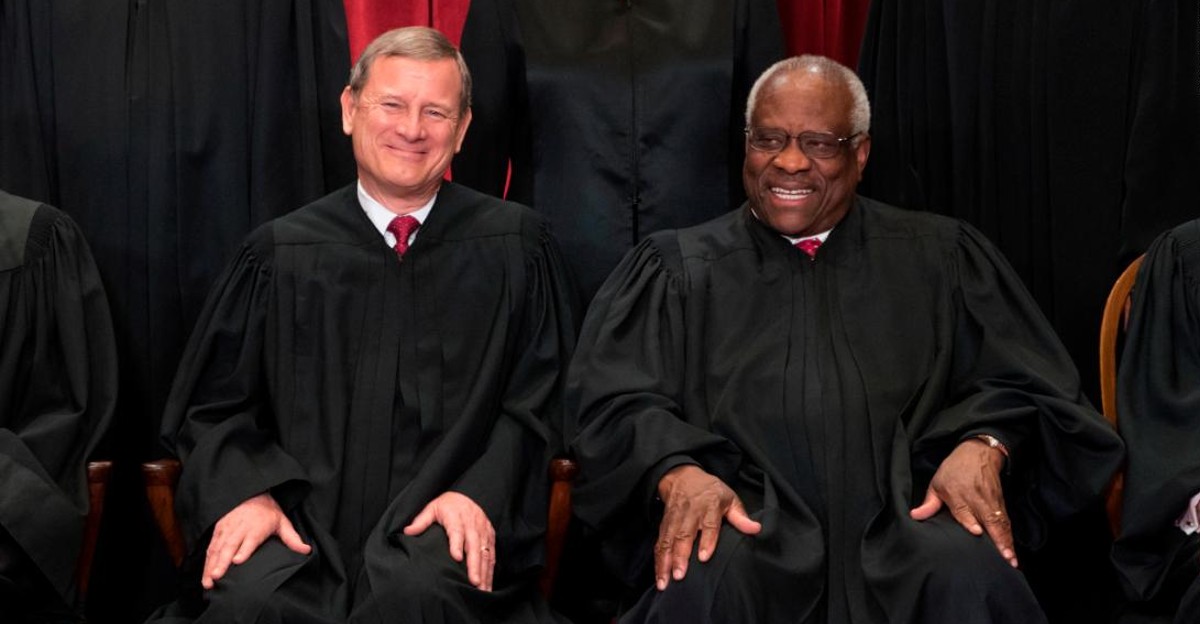OPINION: This article may contain commentary which reflects the author's opinion.
The U.S. Supreme Court heard oral arguments last week in a case led by Republican attorneys general seeking to preserve a Trump-era rule aimed at reducing the number of migrants being permitted to obtain taxpayer-funded benefits.
The GOP AGs stepped in after the Biden administration decided not to legally defend the rule and has instead chosen to try and replace it with one far less stringent.
“More than a dozen Republican attorneys general, led by Arizona’s Mark Brnovich, have sought to defend the 2019 public charge rule, which broadened the definition of ‘public charge’ to include an immigrant who receives one or more designated public benefits for more than 12 months within a 36-month period — and included a substantial number of benefits,” Fox News reported on Saturday.
The outlet adds:
The “public charge” consideration is used when a legal immigrant on a temporary visa seeks permanent legal status, and officials consider whether the immigrant is likely to be reliant on welfare.
Those benefits included in the 2019 rule included Supplemental Security Income (SSI), cash assistance under Temporary Assistance for Needy Families (TANF), as well as most forms of Medicaid and the Supplemental Nutrition Assistance Program (SNAP), commonly known as food stamps.
The Biden administration has since declared the rule not to be in line with the values of the United States and declined to defend it against legal challenges and dropped it. It had previously been blocked from going into effect by a number of appeals courts.
The GOP attorneys general have asked the high court to allow them to step up and defend the Trump-era rule. In an interview with Fox News, Brnovich expressed confidence in how the oral argument portion of the case went in the effort to convince enough justices that the Biden administration’s decision to abandon the rule’s legal defense in several lower courts was without precedent.
“I am happy with our briefing and happy with what happened today in the courtroom,” he said. “I think what was made crystal clear, even from the Biden administration, is that what they did by withdrawing the public charge rule and their sneaky litigation strategy was unprecedented, and I think even the left of center justices recognized that the Department of Justice was doing something unprecedented.”
Brnovich went on to accuse the Biden administration of a “strategic surrender” and of colluding with the plaintiffs in the cases.
A Reuters report noted that both conservative and liberal justices asked why the administration rescinded the rule in the manner it did instead of replacing it with through the normal, and formal, rulemaking process, which raised the prospect that once again, President Biden’s White House violated the Administrative Procedures Act in its attempt to dismantle all of former President Donald Trump’s immigration and border enforcement policies.
Earlier, the high court found the administration violated the act when Biden, and later Department of Homeland Security Secretary Alejandro Mayorkas, attempted to rescind Trump’s “Remain in Mexico” policy.
That said, Reuters also reported that some justices including conservative Brett Kavanaugh noted during arguments that it is not uncommon for administrations to stop legally defending policies they oppose.
“I hope the court, I think the court will do the right thing, and allow us to intervene in the case and fully defend the public charge rule,” Brnovich told Fox News’ Steve Doocy.
The network added:
Meanwhile, the Biden administration announced last week its own public charge rule which would roll back many of the additional benefits that the Trump administration wished to consider. Under the new rule by the Biden administration, SSI, TANF, state, tribal and local cash assistance for income maintenance and “long-term institutionalization at government expense” would still all be considered when officials make a public charge determination.
However, the administration proposes ignoring a range of other taxpayer-funded benefits, which foreign nationals would be able to receive without it ever being held against them on green card applications. Those include SNAP/food stamps, the Children’s Health Insurance Program (CHIP), most Medicaid benefits, housing benefits and transportation vouchers.
